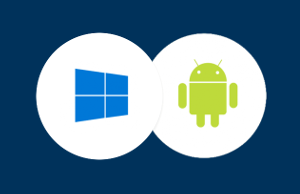What operating system for the terminal?
When buying a terminal (mobile computer), customers can choose the operating system on which their device will run. There are three main groups: proprietary systems, Windows and Android. For all three groups we are able to prepare a turnkey solution for you.
Each option has its pros and cons, none is just bad or unconditionally good. The following table shows the main differences in brief.
| proprietary system | Windows OS | Android OS | |
|---|---|---|---|
| + |
|
|
|
| - |
|
|
|
Now to each of the above options in more detail.
-
This is the product of a terminal manufacturer who has embedded a proprietary operating system into their product. Typical examples are Cipherlab 's 8000, 8200, 8600, etc. terminals or some Opticon terminals (e.g. OPH 1005). The advantage is that they tend to be cheaper. If you just need to check EANs in stock, for example, or do an inventory or asset check once a year, they will do the job. However, you have to count on a simple, sometimes monochrome display and you will need to ask the supplier for a simple template for the required work. Wireless WiFi is also a common problem.You have to set the connection parameters manually, be prepared for signal outages when switching between several access points (roaming) and forget about securing the transmission with encryption. Mobile computers with proprietary systems will not get along with some brands of access points at all.

-
There are three variants: Embedded (formerly called CE), Embedded Handheld (formerly called Mobile) and Windows as such, for example Windows 8, Windows 10. Nowadays, terminals are already made with very high quality displays, the processors are capable of fast operations, you are not limited by the memory of the terminal, in short, they have been in stock all over the world for nearly twenty years. HTML5 web browsers and VT/IBM terminal emulation are available. Care should be taken as to which variant of Windows you choose, as Microsoft is phasing out support for older variants (more HERE). And this becomes limiting with a horizon of 2 - 5 years. The end of Microsoft support does not mean that the terminal will stop working. It means that the applications created cease to be secure and their use becomes a risk to central enterprise systems.
-
Android OS - the latest operating system
Initially, manufacturers were reluctant to move to Android OS because they feared a lack of backward support from Google for older versions Android, which is why some models, such as Honeywell's, allow you to purchase a Windows Embedded OS device and possibly upgrade to Android for an additional fee. But the market is gradually showing that demand for Android OS is growing. One reason for this is the falling prices of terminals. Customers also no longer require a terminal lifetime of 5-7 years, but are considering a 3-5 year horizon, also due to the similarity with mobile phones. As with Windows mobile operating systems, modern technologies such as dual-band stable WiFi, camera, navigation, on-screen document signing, HTML5 web browsers and VT/IBM terminal emulation are available. Unlike the Windows platform, Android has the disadvantage that it does not guarantee backward compatibility of applications - on the other hand, all serious developersmanufacturers of these devices guarantee full functionality for the current version of Android and for at least two future versions of this operating system.A strong reason for mobile computers with Android OS is the ease of learning how to use it. The majority of the population has an Android smartphone, and now the operator only has to learn the specific steps in one application, so the basic principles of operation are no longer a surprise to any warehouse worker.
Often, when choosing an operating system, the customer is guided by the wishes of the programmer who has a favorite one of the systems, then he must respect the environment for which the superstructure is prepared. However, if the customer has a free hand in the choice, he can choose his own way, taking into account his needs, following the advice in this article, or get a recommendation from his terminal supplier. For example, from us... So you don't have to look any further.





